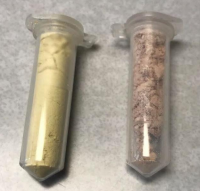Nebraska Food for Health Center maps sorghum genes controlling human gut microbiome

October 4th, 2022
Each of us walks around with trillions of living microbes in our gut. Our diet shapes the kinds and abundance of microbes living in our gut which are connected to our health and well-being. But as scientists learn more and more about which microbes are associated positive and negative impacts on human health, a key question has remained unanswered: "How do we change our own microbiomes?"
The answer may be in the food we eat. Different foods, made from different crops contain a variety of fibers, polyphenols and other natural compounds that can influence the abundance of different microbes within the human gut. Increasing our fiber intake by consuming whole grains vs food made from refined flour is one example. But what if different grains have different effects on our guts?
In a study from the laboratory of Dr. Andrew Benson that was led by Dr. Qinnan Yang, scientists at the Nebraska Food for Health Center demonstrate that natural genetic variation within crop plants can indeed play a major role in controlling growth of specific organisms in human gut microbiomes. In this study the researchers used sorghum, an ancient grain first domesticated in Africa that is grown and consumed around the world today.
For full news story click HERE
High Plains Journal
